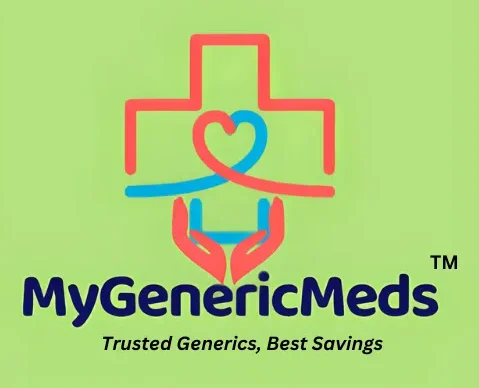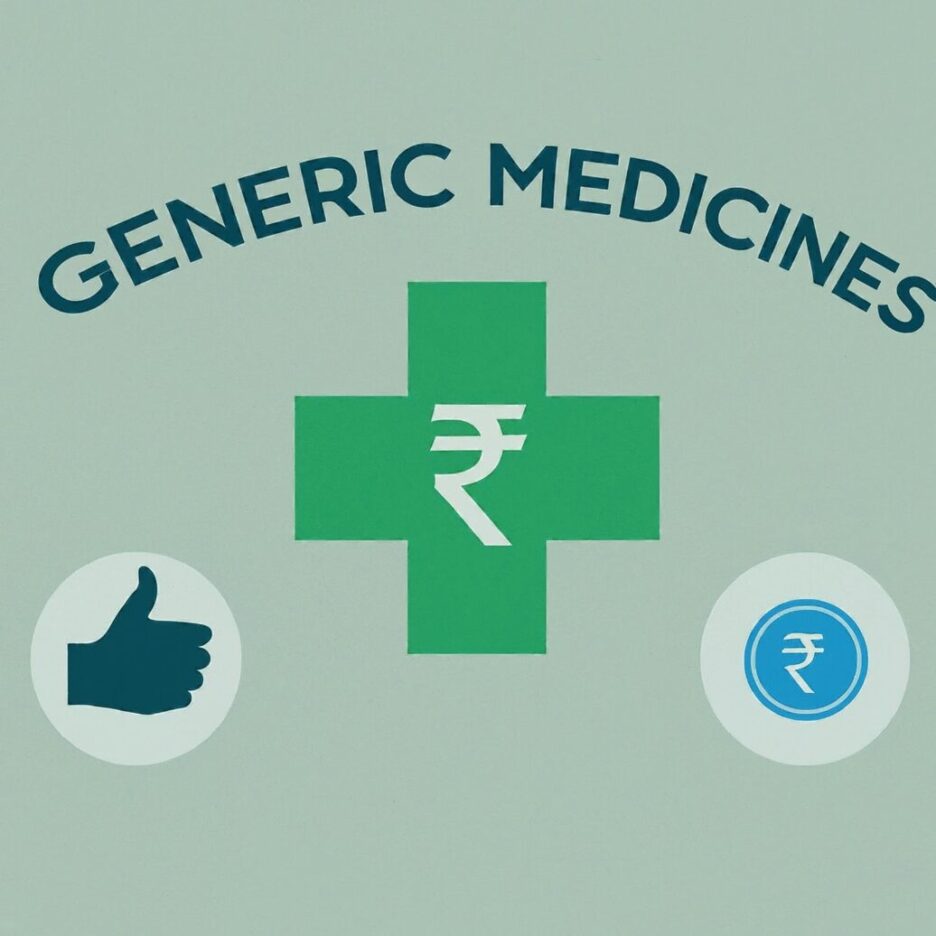Table of Contents
ToggleIntroduction
The ever-rising cost of healthcare in India can be a significant burden for many families. Prescription medications often make up a large chunk of these expenses. Fortunately, there’s a solution that offers significant cost savings without compromising quality: generic medicines.
This comprehensive guide dives deep into the world of generic medicines in India. We’ll explore what they are, dispel common myths, and empower you to make informed choices about your healthcare. By the end, you’ll be equipped with the knowledge and resources to access safe, effective, and affordable generic medications.
Understanding Generic Medicines
Let’s begin by understanding exactly what generic medicines are. Generic medicines are medications that contain the same active ingredients, dosage, strength, safety profile, efficacy, and pharmaceutical quality as their brand-name counterparts. This means they work in the same way and deliver the same therapeutic benefits for the intended condition.
Here’s a key point to remember: Generic medicines typically become available once the patent on the original brand-name drug expires. This patent grants the original manufacturer exclusive rights to produce and sell the drug for a specific period. Once the patent expires, other pharmaceutical companies can then create generic versions of the medication.

Are Generic Drugs Safe and Effective?
A common concern regarding generic medicines is their safety and effectiveness. Let’s put those worries to rest. In India, generic medicines must undergo rigorous testing and approval processes set forth by the Central Drugs Standard Control Organization (CDSCO), which is equivalent to the US Food and Drug Administration (FDA).
These regulations ensure that generic medicines meet the same stringent standards for quality, safety, and efficacy as their brand-name counterparts. They go through extensive testing to demonstrate that they are bioequivalent, meaning they deliver the same amount of the active ingredient to the bloodstream in the same way as the brand-name drug.
Here’s an analogy to understand bioequivalence better: Imagine two keys that unlock the same door. The brand-name drug is one key, and the generic medicine is the other. Both keys may look different, but they both function identically to open the door (treat the medical condition).
The Incredible Benefits of Generic Medicines
Now that we’ve established the safety and efficacy of generic medicines, let’s explore the incredible benefits they offer:
- Massive Cost Savings: This is perhaps the most significant advantage. Generic medicines can be up to 80% cheaper than their brand-name equivalents. This translates to substantial savings for you and your family, making essential treatments more accessible.
- Improved Accessibility: With lower costs, generic medicines make critical healthcare more affordable for a broader population. This is especially crucial in a country like India, where a significant portion of the population struggles with healthcare affordability.
- No Compromise on Quality: As emphasized earlier, generic medicines undergo rigorous testing and meet the same quality standards as brand-name drugs. You can be confident that you’re receiving safe and effective medication.
Let’s look at a real-life example to illustrate the cost savings. Let’s say you’re prescribed a brand-name medication for high blood pressure that costs ₹100 per month. A generic alternative for the same medication might cost just ₹20 per month. That’s a difference of ₹80 per month, or a whopping ₹960 per year! These savings can significantly impact your healthcare budget, freeing up resources for other needs.

Brand-Name vs. Generic: Understanding the Key Differences
While generic and brand-name medications contain the same active ingredients and provide equivalent therapeutic effects, there are a few key differences to be aware of:
- Cost: As we’ve discussed, cost is the most prominent difference. Generic medicines are significantly cheaper because they don’t incur the same expenses for research and development, marketing, and advertising as brand-name drugs. Original manufacturers invest heavily in these areas, which is reflected in the price tag.
- Packaging and Marketing: Brand-name medications often have more elaborate packaging and are heavily marketed. Generic medicines, on the other hand, typically have simpler packaging and are not marketed as widely. These factors contribute to the lower cost.
- Inactive Ingredients: While the active ingredient is the same, generic and brand-name medications may have slight variations in inactive ingredients. Inactive ingredients include things like binders, fillers, and colours. These differences usually don’t affect the drug’s performance but may be a consideration for individuals with allergies or sensitivities to certain ingredients.
It’s important to note that these differences do not impact the safety, effectiveness, or quality of the generic medicine. The active ingredient – the key component that delivers the therapeutic effect – remains the same.
How to Find and Purchase Generic Medicines in India
Now that you understand generic medicines, let’s go through how to find and purchase them in India:
- Talk to Your Pharmacist: Pharmacists are knowledgeable about generic alternatives. When you receive a prescription, ask if a generic version is available and what the cost difference is.
- Look for the Generic Name: Medication packaging in India typically lists both the generic name and the brand name. The generic name will usually be in smaller print below the brand name. Pay attention to this, and discuss generic options with your doctor or pharmacist.
- Jan Aushadhi Stores: The Indian government runs Jan Aushadhi stores specifically to provide quality generic medicines at significantly discounted prices. Look for a Jan Aushadhi store near you to access affordable medications. You can find a list of these stores on their website.
Online Pharmacies: Few online pharmacy marketplace platforms like My Generic Meds sell a wide range of generic medicines in India. Ensure you choose a reliable pharmacy with proper licensing and accreditation. They often have convenient home delivery services. My Generic Meds is an online generic pharmacy store dedicated to providing high quality branded generic medicines at affordable prices. It stocks a large variety of medicines for different health problems like Diabetes, Blood Pressure/Hypertension, Heart Care, Neuro, Kidney care, Antibiotics and Multivitamins.
Where to Find the Generic Medicine Price List in India
To compare prices for generic medicines and potentially identify even more savings, here are some resources where you can locate the generic medicine price list in India:
- Government Websites: The National Pharmaceuticals Pricing Authority (NPPA) website offers a price list for essential medicines and medical devices.
- Consumer Resources: Websites dedicated to medicine prices in India, often allow you to search for specific medications and compare prices across different brands and pharmacies. On another note, you can always compare the prices on your own, either online or offline.
Keep in mind that prices might vary slightly between pharmacies, so it’s worth checking with a few different sources to find the best deals.
Top Trusted Generic Medicine Manufacturers in India
India has a robust generic pharmaceutical industry, and there are many reputable companies that produce high-quality generic medicines. Here’s a list of some of the top trusted generic medicine companies in India:
- Cipla: One of the largest pharmaceutical companies in India, Cipla has a wide range of generic products across various therapeutic areas.
- Sun Pharma: Another major player, Sun Pharma provides an extensive portfolio of affordable and high-quality generic medicines.
- Lupin: Known for its cardiovascular, anti-diabetic, and respiratory medications, Lupin is a well-respected generic medicine manufacturer.
- Dr. Reddy’s Laboratories: With a strong focus on research and development, Dr. Reddy’s offers innovative generic medications at competitive prices.
- Aurobindo Pharma: Aurobindo Pharma supplies generic medicines across a diverse range of therapeutic areas, including antibiotics and antivirals.
- Zydus Cadila: A large Indian pharmaceutical company with a strong presence in the generic medicine market.
- Mankind Pharma: Mankind Pharma specializes in affordable generic medicines for chronic diseases.
- Torrent Pharmaceuticals: With a well-established reputation, Torrent Pharmaceuticals provides high-quality generic medications.
These are just a few examples, and there are many other reputable generic medicine companies in India. When choosing a generic medicine, it’s essential to look for manufacturers known for their quality and adherence to regulatory standards.

How Developed Countries Deal with Generics: Lessons for India
Developed countries like the United States, Canada, UK and many European nations have long embraced generic medicines as a cost-effective strategy within their healthcare systems. These countries provide valuable insights that India can learn from to further strengthen its own generic medication landscape.
Generic Prescription Policies: Doctors in several developed nations often have a strong emphasis on prescribing medications by their generic name rather than brand names. This practice encourages the use of generic alternatives whenever available and appropriate. It also helps reduce confusion and prevents pharmacists from substituting with a higher-priced brand-name option, even when a more affordable generic version is available.
Robust Regulatory Frameworks: Like India, developed countries maintain stringent regulatory bodies that oversee the manufacturing, safety, and efficacy of generic medications. This ensures that generic drugs meet the same quality standards as brand-name medications, building trust in the generic medicine system.
Incentives for Generic Use: Insurance systems and government-funded healthcare programs in many developed countries actively incentivize the use of generics. This may include lower co-pays or preferred coverage for generic medications, further reducing costs for patients.
Public Education: Healthcare systems and patient advocacy groups in developed nations often invest in public education campaigns to raise awareness about generics and dispel myths about their safety or effectiveness.
Opportunities for Improvement in India
While India has made significant strides in promoting accessibility and understanding of generic medicines, there are opportunities to adopt strategies from developed nations to further optimize their use:
Strengthening Generic Prescription Practices: Encouraging doctors to prescribe by generic names more frequently would streamline the process for patients and pharmacists. This would increase generic utilization and potentially reduce prescription errors.
Enhanced Public Awareness Campaigns: Continued public education initiatives can address lingering misconceptions about generic medicines and build confidence in their quality and effectiveness.
Streamlining Regulatory Processes: Optimizing approval processes for generic medications could further expedite their availability in the market, increasing competition and potentially driving prices even lower.
By incorporating lessons from developed nations, India can continue to enhance its generic medicine landscape, ultimately leading to even greater healthcare affordability and accessibility for its population.
Making Informed Choices: Questions to Ask Your Doctor
Before switching to a generic medicine, it’s always best to consult with your doctor. Here are some questions to ask to ensure a smooth transition:
- “Is there a generic version of my current medication available?”: This is the most crucial question. Your doctor can confirm the availability of a generic alternative that’s suitable for you.
- “Can you explain any potential differences I should be aware of?”: While minor differences in inactive ingredients are possible, your doctor can clarify if these would have any implications for your treatment.
- “Are there any reasons why I might not be a good candidate for a generic medicine?”: In rare cases, your doctor may recommend sticking with the brand-name medication for specific medical reasons but in most cases, if the salt composition of your brand-name medicine is the same as Generic medicine, then it should not be any issue. Again, consult your doctor before switching to Generics.
Your doctor can help you make informed decisions about generic medicines and address any concerns you might have. They can also guide you on how to switch between brand-name and generic drugs safely.
The Expanding Role of Generic Medicines in Indian Healthcare - Myths and Facts
Generic medicines are playing an increasingly vital role in India’s healthcare system, making treatments more accessible and affordable for millions of people. Let’s dive into how they are making a difference:
- Growing Availability: The number of generic medications available in the Indian market is steadily increasing. This provides patients and healthcare providers with more choices and flexibility when it comes to finding affordable treatment options.
- Government Initiatives: The Indian government has been actively promoting the use and awareness of generic medicines. Programs like the Pradhan Mantri Bhartiya Janaushadhi Pariyojana (PMBJP), which operates Jan Aushadhi stores, are dedicated to ensuring everyone has access to affordable medicines.
- Improving the Healthcare Landscape: Generic medicines are essential for achieving universal healthcare coverage in India. As costs decrease, more people can afford the essential medications they need to manage both acute and chronic health conditions. This leads to better health outcomes and a reduced burden on the healthcare system in the long run.
Let’s consider the case of diabetes, a growing health concern in India. The cost of managing diabetes can be substantial, including medications like insulin and oral anti-diabetic drugs. Generic alternatives for these medications significantly reduce treatment costs, making diabetes management more accessible for patients, especially those from lower-income households.
The availability of generic medicines also has broader implications for healthcare spending. When patients can afford their medications, they are more likely to adhere to treatment plans and manage conditions effectively. This can help prevent complications and reduce hospitalizations, ultimately leading to overall healthcare cost savings.
Furthermore, generic medicines play a crucial role in expanding healthcare access beyond urban centers. By making medications more affordable, rural populations and those living in remote areas can get the treatment they need, helping bridge the gap in healthcare disparities. The affordability of generic medicines, combined with government initiatives to distribute them, contributes to a more equitable and accessible healthcare system in India. Below are a few myths surrounding the Generics and the actual facts busting these myths.
Myth #1: Generics are less effective than brand-name medicines.
- Fact: Generic medicines contain the same active ingredients as their brand-name counterparts, and they are designed to work in the exact same way in the body. They undergo rigorous testing by regulatory bodies like the CDSCO in India to ensure bioequivalence, meaning they deliver the same therapeutic effects.
Myth #2: Generics are of lower quality and have more side effects.
- Fact: Generic medicines adhere to the same strict manufacturing and quality control standards as brand-name drugs. They are not inherently inferior. The side effects of a medication are tied to the active ingredient itself, not whether it’s in a generic or brand-name form. Any side effects listed for a brand-name drug will also apply to its generic counterparts.
Myth #3: Doctors don’t recommend generics.
- Fact: Many doctors actively encourage the use of generic medicines when appropriate. They recognize generics as a safe and effective way for patients to save money on their healthcare. If your doctor prescribes a brand-name medicine, don’t hesitate to ask if a generic alternative is available and suitable for your treatment. Also, you can check the ingredients of the brand-name medicine and search for the same in Generic Medicine marketplace portal like mygenericmeds.co.in to find the Generic equivalent.
Myth #4: Taking generics can interfere with other medications.
- Fact: The active ingredients in generic drugs are identical to those in brand-name versions, so they have the same potential for interactions with other medications. Always inform your doctor and pharmacist about all the medications you’re taking, including over-the-counter drugs and supplements, regardless of whether they are brand-name or generic.
Myth #5: Generic medicines are not readily available or convenient.
- Fact: Generic medicines are widely available in India, particularly with the growth of initiatives like Jan Aushadhi stores. Pharmacists are also well-versed in identifying generic equivalents. With online pharmacies offering home delivery, accessing generic medications can be incredibly convenient. There is no point paying more money if you are getting the same medicines at lower prices.
Key Takeaways
- Generic medications are a smart and safe choice for those seeking affordable healthcare, as they offer the same quality, effectiveness, and side-effect profile as their brand-name equivalents.
- Busting these myths helps create more awareness and confidence in choosing generic options, allowing for greater savings without compromising the quality of one’s healthcare.
Conclusion
Generic medicines are an affordable solution for Indians seeking quality and effective healthcare without breaking the bank. They offer the same safety and therapeutic benefits as their brand-name equivalents while saving you a significant amount of money.
By understanding generic medicines, where to find them, and choosing reputable manufacturers, you can take control of your healthcare expenses. Remember, always talk to your doctor or pharmacist before switching medications and ask about generic alternatives whenever a prescription is filled.
My Generic Meds (www.mygenericmeds.co.in) is an online pharmacy facilitator only and all the medicines listed on its site and sold through the My Generic Meds are sole responsibility of the offline medicine store it has on-boarded/partnered to supply medicines to its customers on the platform.
Call to Action: Have you had positive experiences with generic medicines in India? Share your experiences and tips in the comments below to help others make informed healthcare choices!






